Personalizing Entertainment Packages Will Get Daunting
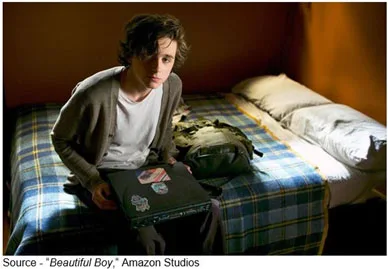
Was listening to streaming music on our computer thinking about the changes we had made in our TV viewing when Justin Timberlake came on.
About half way through his song, we said to ourselves, “My gawd, he’s singing about the state of the television industry.”
The song, What Goes Around Comes Around.
In case you don’t know, here is some of the lyrics:
I just can’t seem to understand
Thought it was me and you, babe
Me and you until the end
But I guess I was wrong
Should have known better when you came around
That you were gonna make me cry
It’s breaking my heart to watch you run around
‘Cause I know that you’re living a lie
That’s okay, baby, ’cause in time you will find
What goes around, goes around, goes around
Maybe we will, maybe we won’t.
We never did like the relationship we had with the cable guy.
It was sorta’ “take it or leave it.”
Most people only had one service option for TV entertainment so it was, “here’s the bundle, the price and support … when we get around to it.”
Then, the internet/wireless got robust and reliable WiFi and 4G LTE service became available. Netflix saw the opportunity to give you great content you could stream OTT (over the top) to your smart 4K TV and even to your mobile device when you wanted, where you wanted it.
Suddenly, you had an option!
The Netflix team started spending money on great scripts, great producers, great production crews and technology that helped them determine what folks liked to watch and how long they watched as well as insight into what else they might want to view.
It got to the point where now they have 60.55M subscribers in the U.S., 148M worldwide and show no sign of slowing down.
It looked good to Amazon and they already had great analytics about what customers liked, didn’t like, bought and returned; so, they jumped in with Amazon Prime.
Hulu, HBO, CBS, ABC, Telemundo, BBC, Sky, Foxtel, Quickflix, France TV, M6, ITV, ProSiebenSat.1, Discovery, Rogers, Prime Video, Hotstar, Jooq, Fuji TV, Tencent Video, iQiyi, Youku Tudou and heck; every network, studio and station around the globe jumped on the streaming bandwagon.
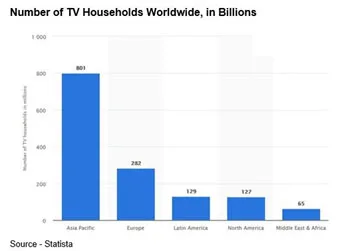
It’s too good to pass up:
- 4B households around the globe
- 4B worldwide households own at least one TV set (69 percent in developed countries)
- 59M households in the U.S., 120M with TVs
- 108M US households with broadband
- S. penetration projected to be 16.5 percent this year, 18.3 percent by 2023
The market is so tempting that AT&T bought Times Warner for a whopping $85.4B so it could have content to stream.
Not to be outdone, Disney bought 21st Century Fox which included Marvel, Hulu, ESPN, National Geo and “others” for $71.3B and plans to introduce Disney Plus this year.
YouTube, with more than 1.5B viewers worldwide, figured it was time to got serious about this TV stuff and rolled out their streaming service – YouTube TV – across the U.S. (just in time for the Super Bowl) and offering more than 60 channels, whichvaries by location.
Obviously, they’re knocking on as many station/network doors as they can; so pretty soon, you’ll probably be thinking of them the same way you think about your cable bundle.
With their deep pockets, it will be interesting to see how they expand internationally.
To feel like they’re a major player, Viacom bought Pluto TV for a paltry $340M.
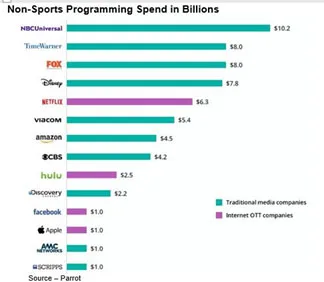
And folks worry about Netflix content investment?
It’s a market that is a long way from being saturated.
Digital TV Research suggests global SVOD subscriptions will top 777M, up from 520M last year.
China and the United States will generate more than 50 percent of the global SVOD subscribers and nine other countries will have more than 10M SVOD subscribers each.
While Netflix and Amazon Prime don’t/can’t operate in China, the country will have 235M SVOD subscribers.
SVOD revenue will reach $69 billion by 2023; up by nearly $44 billion since 2017. The U.S. will remain the SVOD revenue leader by a considerable distance – adding $17 billion between 2017 and 2023 to take its total to $29 billion.
Is it any wonder people are shouting with glee that the cable bundle folks are a dying breed?
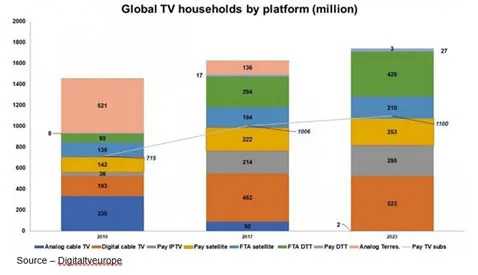
According to Leichtman Research Group, there are still 91.3M cable subscribers in the U.S.; and globally, they will grow 4.8 percent through 2024 to 523M
To ensure they stay relevant, cable companies are reinventing themselves … honest!
They’ve begun:
- Offering service options – not just here’s the bundle, live with it including bundle options (priced accordingly)
- Introducing IPTV (internet protocol TV) services that allow customers to stream content to their TV and mobile devices
- Adding various pay-TV options (depending on the carrier) like Netflix, Amazon Prime, Hulu, Starz and regional pay options including sports channels
- Adding new streaming ad-supported channels
- Offering home security, smart home, wireless phone services
- Upping their service/support game
To win over the consumer, wireless carriers are beginning to roll-out 5G service that promise download speeds of 4.5GB/s and median speeds of 1.4GB.
It’s great if you happen to be in one of the cities that have the infrastructure built out and don’t move around too much.
To beat the competition, AT&T has already introduced 5G E (eventually) service on their 4G LTE network.
For most folks, 4G LTE is good enough and fast enough as long as you don’t benchmark your performance improvements and compare the “super fast” service with your previous wireless service bundled cost.
Broadcasters finished their ATSC 3.0 (NextGen TV) trials and are beginning to roll-out the new fixed and wireless service.
Designed for content, the service will deliver 4K UHD content as well as enhancements – HDR (high dynamic range), WCG (wide color gamut) and HFR (high frame rate) at 10GB speeds (both directions).
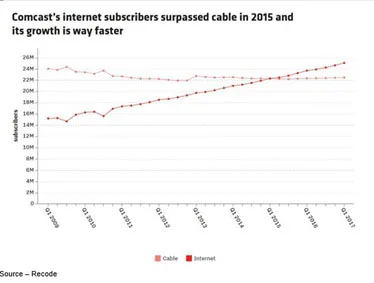
So, when we cut the cord for streaming, we didn’t really cut the cord; we just told them we only wanted the internet to the house.
We know we said there wasn’t a lot of love for the cable guy but the option was the AT&T dude/dudette and their smoke/mirrors.
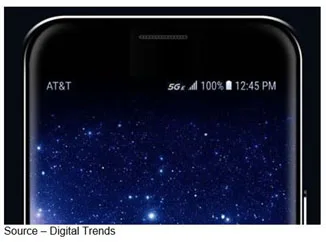
Somehow, when the company simply changed the marketing of the same old service to 5G Eventually, it just sorta’, kinda’ didn’t seem quite right – https://tinyurl.com/y7yhz2f5, https://tinyurl.com/y8q3wuxu.
But that’s us.
Yeah, could have signed up with Verizon (have lots of respect for Hans Vestberg, their new boss) and waited for 5G to be in place.
However, since both the new wireless and NextGen TV networks are going to be available in the roughly same timeframe (2023-2025) and will complement each other, we figured we’d stick with the devil we know for our content.
We do like the fact that Verizon isn’t wasting time 5G posturing but instead focusing on getting the hard work done.
Then too, the cable guy seems to have figured out that to keep your business, customer service has to become more important … a little.
The one thing we do know is that streaming is here to stay and growing … rapidly. According to Cisco globally:
- Consumer IP video traffic will be 84 percent of consumer IP traffic by 2022, up from 79 percent in 2017
- IP video traffic will grow 4-fold from 2017 to 2022, a compound annual growth rate of 29 percent
- Ultra HD (4K) will be 22.3 percent of IP video traffic by 2022, up from 3.3 percent in 2017 (89.1 percent CAGR)
- HD will be 56.8 percent of IP video traffic by 2022, up from 46.4 percent in 2017 (34.2 percent CAGR)
- SD will be 20.9 percent of IP video traffic by 2022, compared to 50.3 percent in 2017 (8.2 percent CAGR)
- IP video will be 82 percent of all IP traffic by 2022, up from 75 percent in 2017
- Fixed/Wi-Fi was 43 percent of total IP traffic in 2017, and will be 51 percent of total IP traffic by 2022
- Fixed/wired was 48 percent of total IP traffic in 2017, and will be 29 percent of total IP traffic by 2022
- Mobile was 9 percent of total IP traffic in 2017, and will be 20 percent of total IP traffic by 2022
In other words, there’s going to be enough content out there.
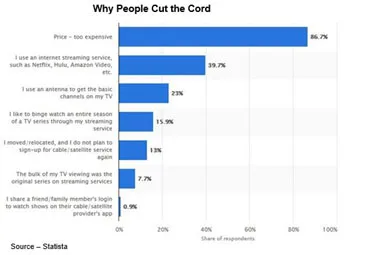
Lots of folks cut their cable to save money and then subscribe to just the services they want … freedom of choice.
So, how did that work out for you?:
- Internet connection – $40-$60 per month
- Netflix – $16 per month
- Hulu – $45 per month (limited commercials + live TV)
- Amazon Prime – $9 per month (plus free shipping)
- YouTube TV – $40 per month
- Disney Plus – ????
Helluva’ deal!
Folks are suffering from an embarrassment of riches when it comes to options, so we’ll see a new type of bundling emerge.
Think Roku or any connected box.
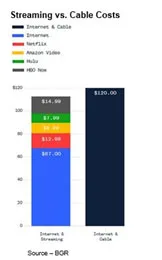
Connect it – or one of the other options – to your smart 4K TV or new 8K set even though there’s no 8K content, figure out your own custom bundle for the number of users/screens you want to use and BAM!! you’ve got your own personalized bundle.
Of course, things will change and so will your family’s and your tastes in entertainment.
News, TV shows, movies, live sports/concerts, you name it; the selection (and cost) will be daunting for many.
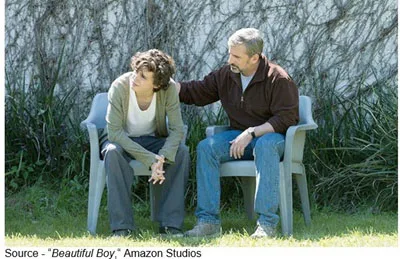 Some people worry as David Sheff did (but for different reasons) when he said, “My son is out there somewhere, and I don’t know what he’s doing! I don’t know how to help him!”
Some people worry as David Sheff did (but for different reasons) when he said, “My son is out there somewhere, and I don’t know what he’s doing! I don’t know how to help him!”
Just remember Justin’s song, “What goes around, goes around, goes around”
# # #